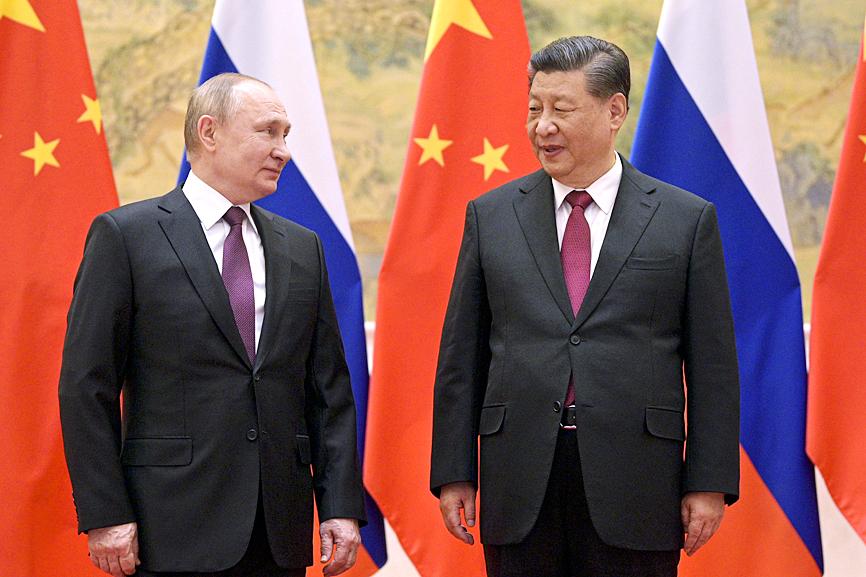China so far does not appear to be helping Russia evade Western financial sanctions on Moscow over its invasion of Ukraine, but doing so would “do profound damage” to China’s reputation, a senior official from the administration of US President Joe Biden said on Saturday.
“The latest signs suggest that China’s not coming to the rescue,” the official told reporters after announcing that the US and its allies agreed to impose sanctions against Russia’s central bank and disconnect key Russian banks from the SWIFT international financial transaction network.
Reports that some Chinese banks have stopped issuing letters of credit for purchases of physical commodities from Russia were a positive sign, the official said.

Photo: AP
This “suggests that, much like has been the pattern for years and years, China has tended to respect the force of US sanctions,” the official added.
China is Russia’s biggest trade partner for both exports and imports, buying one-third of Russia’s crude oil exports in 2020 and supplying it with manufactured products from cellphones and computers to toys and clothing.
Some of that trade is conducted in China’s yuan currency, which could technically fall outside of sanctions aimed at cutting Russia off from transactions in US dollars, euros, sterling and other major currencies.
However, Chinese banks that do business with Russian banks and other entities hit with full blocking sanctions and put on the US Department of the Treasury’s “specially designated nationals” list could face sanctions themselves and loss of access to the US financial system.
The official said that if China were to help Russia evade US sanctions, “it really would be an unfortunate signal for China’s vision of the world,” and give “tacit or explicit accommodation to Russia’s invasion of a sovereign country in the heart of Europe.”
“It would do profound damage to its reputation in Europe, but really across the world,” the official said of China.

The Taiwanese passport ranked 33rd in a global listing of passports by convenience this month, rising three places from last month’s ranking, but matching its position in January last year. The Henley Passport Index, an international ranking of passports by the number of designations its holder can travel to without a visa, showed that the Taiwan passport enables holders to travel to 139 countries and territories without a visa. Singapore’s passport was ranked the most powerful with visa-free access to 192 destinations out of 227, according to the index published on Tuesday by UK-based migration investment consultancy firm Henley and Partners. Japan’s and

NATIONAL SECURITY THREAT: An official said that Guan Guan’s comments had gone beyond the threshold of free speech, as she advocated for the destruction of the ROC China-born media influencer Guan Guan’s (關關) residency permit has been revoked for repeatedly posting pro-China content that threatens national security, the National Immigration Agency said yesterday. Guan Guan has said many controversial things in her videos posted to Douyin (抖音), including “the red flag will soon be painted all over Taiwan” and “Taiwan is an inseparable part of China,” while expressing hope for expedited “reunification.” The agency received multiple reports alleging that Guan Guan had advocated for armed reunification last year. After investigating, the agency last month issued a notice requiring her to appear and account for her actions. Guan Guan appeared as required,

Japan and the Philippines yesterday signed a defense pact that would allow the tax-free provision of ammunition, fuel, food and other necessities when their forces stage joint training to boost deterrence against China’s growing aggression in the region and to bolster their preparation for natural disasters. Japan has faced increasing political, trade and security tensions with China, which was angered by Japanese Prime Minister Sanae Takaichi’s remark that a Chinese attack on Taiwan would be a survival-threatening situation for Japan, triggering a military response. Japan and the Philippines have also had separate territorial conflicts with Beijing in the East and South China

A strong cold air mass is expected to arrive tonight, bringing a change in weather and a drop in temperature, the Central Weather Administration (CWA) said. The coldest time would be early on Thursday morning, with temperatures in some areas dipping as low as 8°C, it said. Daytime highs yesterday were 22°C to 24°C in northern and eastern Taiwan, and about 25°C to 28°C in the central and southern regions, it said. However, nighttime lows would dip to about 15°C to 16°C in central and northern Taiwan as well as the northeast, and 17°C to 19°C elsewhere, it said. Tropical Storm Nokaen, currently